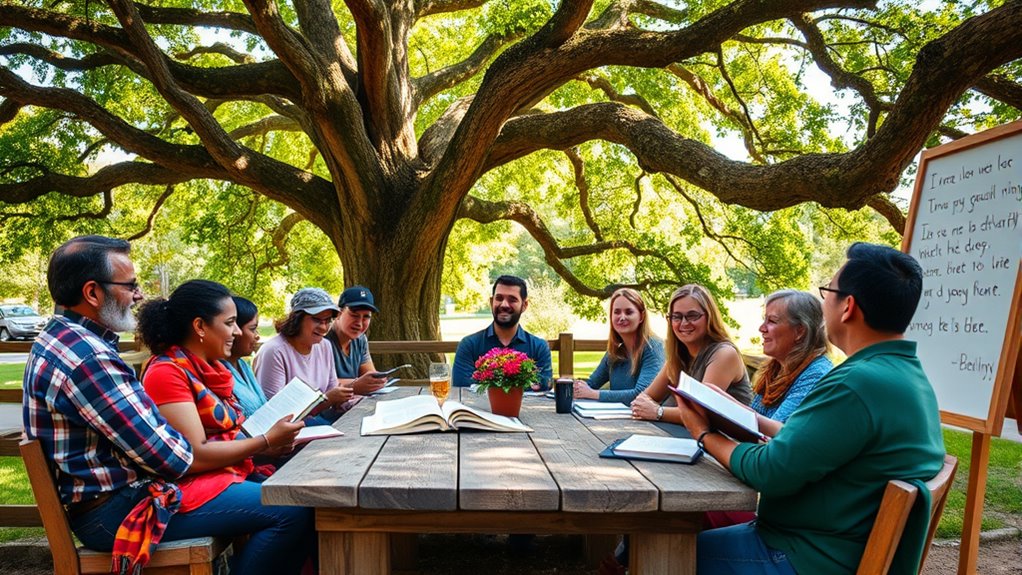To start a community Bible study outreach, begin by clarifying your goals and identifying the needs of your target audience. Choose accessible venues and convenient times, and develop engaging, relatable content that resonates with your community. Focus on building genuine relationships through personal invitations, storytelling, and shared activities. Create a warm atmosphere with prayer and reflection, and promote your efforts through social media and local channels. If you want to grow and sustain this outreach, there’s more to ponder ahead.
Key Takeaways
- Define clear objectives aligned with faith and community needs to guide outreach efforts effectively.
- Choose accessible venues and schedule meetings during convenient community times to maximize participation.
- Use engaging storytelling, media, and visuals to make biblical lessons relevant and inviting.
- Build genuine relationships through personal conversations, sharing stories, and organizing community service projects.
- Develop and empower leaders within the group to sustain growth, foster ownership, and create a vibrant spiritual community.
Identifying Your Goals and Target Audience
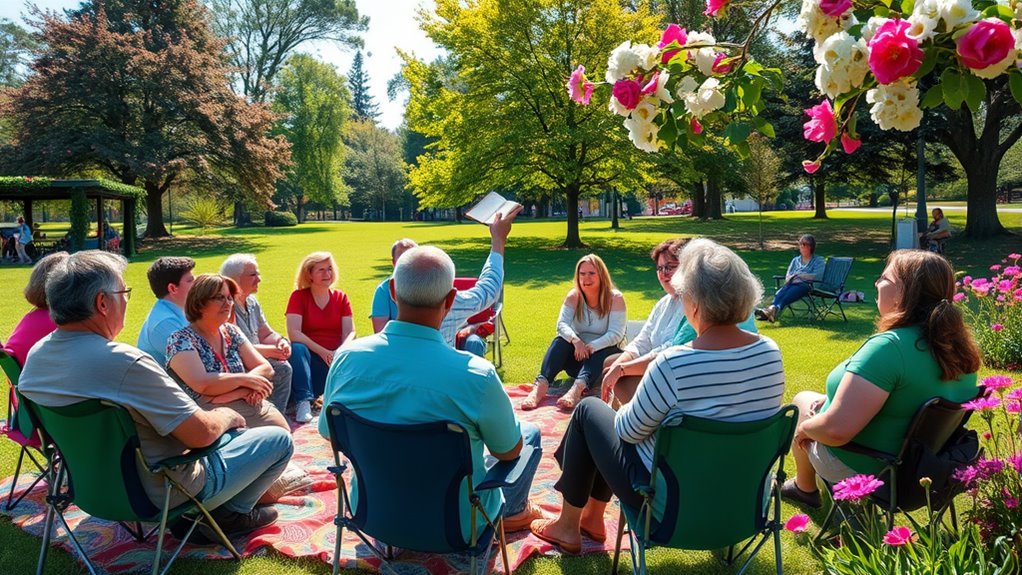
Before launching your community Bible study outreach, you need to clearly define your goals and identify your target audience. Understanding your purpose helps guarantee your efforts stay focused and effective. Consider how your outreach aligns with your faith and the broader community’s needs—this is faith alignment. It’s also vital to approach your target audience with cultural sensitivity, respecting diverse backgrounds and beliefs. Ask yourself who you want to reach and what they need from a Bible study. Are you aiming to strengthen faith, build community, or offer spiritual support? Clarifying these points helps tailor your approach, making your outreach more relevant and welcoming. When you’re clear on your goals and audience, you’ll create a strong foundation for your community Bible study. Additionally, fostering open dialogue and vulnerability within your group can significantly enhance understanding and connection among participants.
Selecting the Right Location and Time
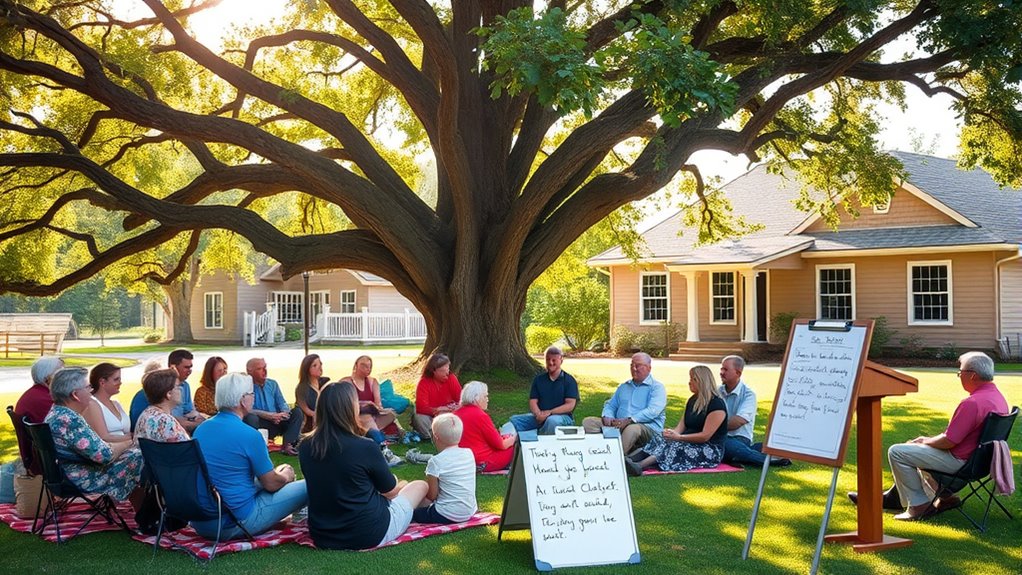
Choosing the right location and time for your community Bible study is essential to encourage attendance and foster a welcoming environment. When selecting venue options, consider accessible and comfortable spaces like churches, community centers, or even local cafes. Think about convenience for your target audience, ensuring the venue is easy to reach and welcoming. Scheduling considerations are equally important; choose a time that fits your community’s routines—weeknights or weekends often work well. Be mindful of potential conflicts with other local events or religious commitments. Additionally, confirm the venue’s availability and any necessary permissions ahead of time. By thoughtfully choosing your location and time, you set a strong foundation for a successful and engaging Bible study that draws people in and keeps them coming back. Incorporating community outreach strategies can further enhance attendance and engagement.
Planning Engaging and Relatable Bible Content
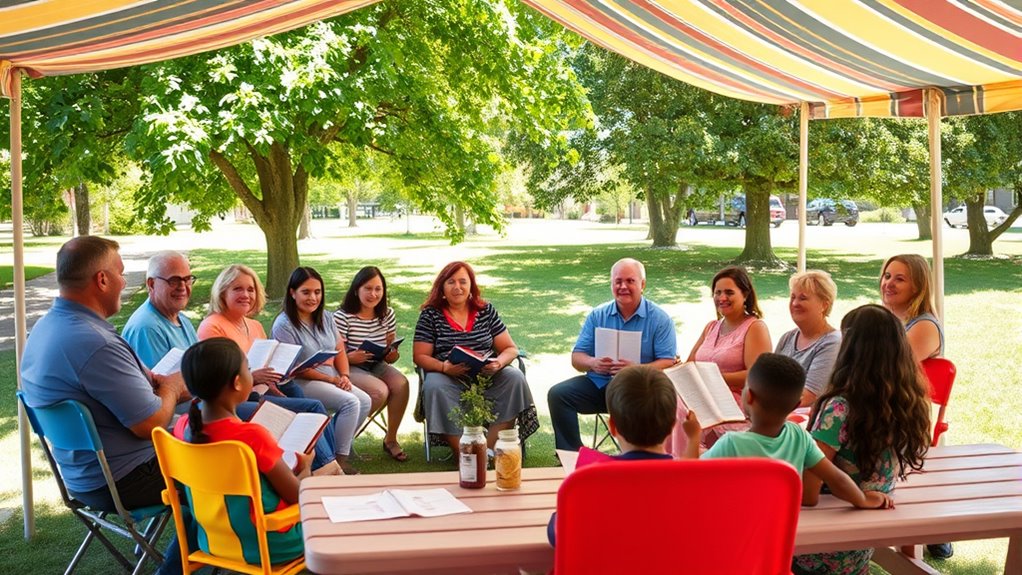
Creating engaging and relatable Bible content is essential to capturing your audience’s interest and helping them connect personally with Scripture. Use creative storytelling to bring biblical lessons to life, making ancient stories relevant today. Incorporate modern media, like videos or social media snippets, to make content more dynamic and accessible. Tailor your material to the needs and experiences of your community, ensuring it resonates deeply. Here’s a simple guide to keep your content engaging: High-quality content helps establish credibility and trustworthiness, encouraging ongoing participation and reflection.
Inviting Community Members With Heartfelt Outreach

Connecting personally with community members helps build trust and shows you genuinely care. When you invite someone, make your approach heartfelt and sincere, rather than just informative. By focusing on authentic interactions, you create a welcoming environment that encourages participation. Incorporating community engagement strategies can further strengthen connections and foster a sense of belonging.
Personal Connection Strategies
Reaching out to community members with heartfelt sincerity can make a meaningful difference in inviting them to your Bible study. Personal stories are powerful tools that help others see your genuine faith and experience. Sharing your own journey creates relatability and trust, encouraging openness. Focus on one-on-one conversations to build authentic relationships, allowing you to listen actively and respond with empathy. When you speak from the heart, people feel valued and understood, making them more receptive to your invitation. Remember, it’s about establishing a connection before extending an invitation, so take time to understand their needs and experiences. Personal connection strategies like sharing stories and engaging in sincere conversations foster trust and lay a strong foundation for community growth. Incorporating effective communication techniques can further enhance your outreach efforts.
Genuine Invitation Approaches
Once you’ve established genuine relationships through heartfelt conversations, extending an invitation becomes a natural step. When inviting community members, show cultural sensitivity by respecting their backgrounds and perspectives. Personalize your approach to make them feel valued, not pressured. Use technology outreach thoughtfully—send a friendly message or share a relevant social media post to gently invite them. Remember, heartfelt invitations focus on connection, not obligation. Keep these points in mind:
- Be authentic and sincere in your words.
- Respect cultural differences and individual comfort levels.
- Utilize technology to create a welcoming, non-intimidating invitation.
- Recognize that understanding symbolism in dreams can help foster deeper spiritual conversations.
Creating a Warm and Welcoming Environment

Creating a warm and welcoming environment starts with cultivating a friendly atmosphere that makes everyone feel comfortable. Using inclusive communication strategies guarantees all voices are heard and valued. When you focus on these points, you’ll foster a space where community members want to return and grow together. Incorporating self watering plant pots can serve as a metaphor for nurturing relationships and ensuring everyone’s needs are met in the group.
Friendly Atmosphere Tips
A warm and welcoming environment starts with genuine friendliness. When you greet visitors with a smile and open body language, you set a positive tone. Use casual decor to create a relaxed atmosphere that feels approachable. Friendly signage, like clear directional signs and welcoming messages, helps newcomers feel comfortable and informed. To foster a friendly atmosphere, consider these tips:
- Keep decor simple and inviting, avoiding clutter
- Use friendly signage that clearly guides newcomers
- Encourage volunteers to engage warmly with everyone
- Be mindful of market trends and insights to better connect with visitors interested in current events or financial topics
Inclusive Communication Strategies
Building on a friendly atmosphere, inclusive communication guarantees everyone feels genuinely welcomed and valued. Use inclusive language that respects diverse backgrounds, perspectives, and experiences. Avoid jargon or idioms that might confuse newcomers; instead, opt for clear, straightforward language. Practice accessible communication by speaking at a comfortable pace, using simple words, and providing visual aids when needed. Encourage active listening, ensuring everyone has the opportunity to share and be heard. Be mindful of non-verbal cues, such as facial expressions and gestures, to create a safe space. By intentionally choosing inclusive language and accessible communication methods, you foster an environment where all feel comfortable participating and growing in their faith journey. Additionally, understanding the importance of color accuracy in visual settings can help in creating a welcoming atmosphere that is visually engaging and comfortable for all participants.
Building Relationships and Fostering Community
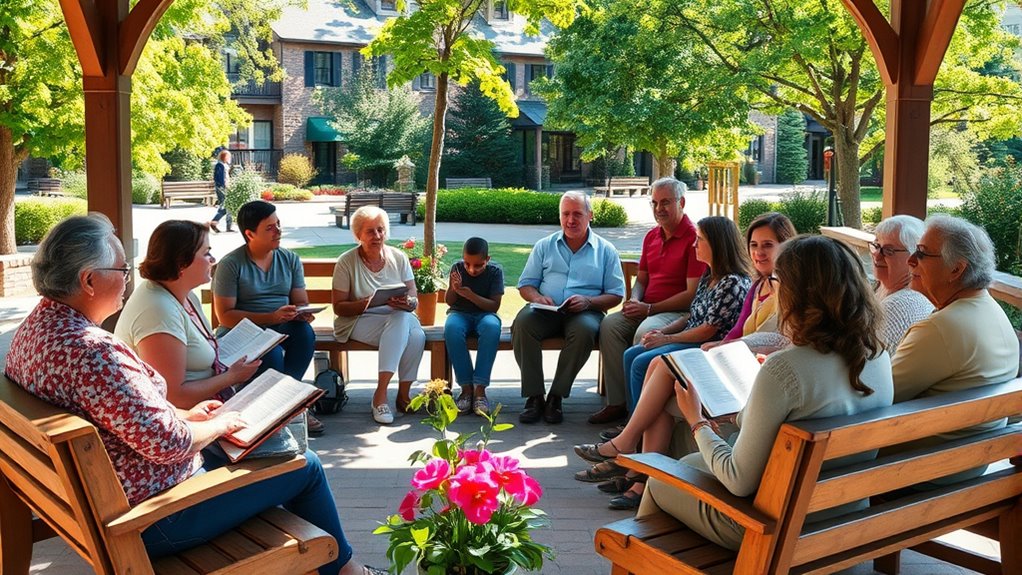
How can you truly connect with others in your community and foster a sense of belonging? Building relationships starts with genuine interactions. Share personal testimonies to open hearts and encourage trust. Organize community service projects to demonstrate your commitment and create shared experiences. These activities help break down barriers and build bonds. To deepen connection, consider:
Building genuine relationships through sharing, service, and active listening fosters true community belonging.
- Listening actively and showing empathy
- Celebrating each other’s milestones
- Inviting others to participate in meetings and outreach efforts
- Incorporating spiritual growth practices to strengthen bonds and support personal development
Incorporating Prayer and Reflection Into Meetings

As your community grows closer through meaningful relationships and shared experiences, incorporating prayer and reflection into your meetings can deepen that connection. Start with moments of meditative silence, allowing everyone to pause and listen for God’s guidance. This quiet time encourages personal reflection and spiritual openness. You can also introduce prayer journaling, where members write down their thoughts, prayers, and insights. This practice helps individuals process what they’ve learned and stay engaged with their faith journey. Incorporating these elements creates a sacred space for authentic connection, fostering a deeper understanding of scripture and each other’s experiences. Over time, these practices strengthen your community’s spiritual foundation and encourage ongoing growth in faith.
Promoting Your Bible Study Outreach Effectively
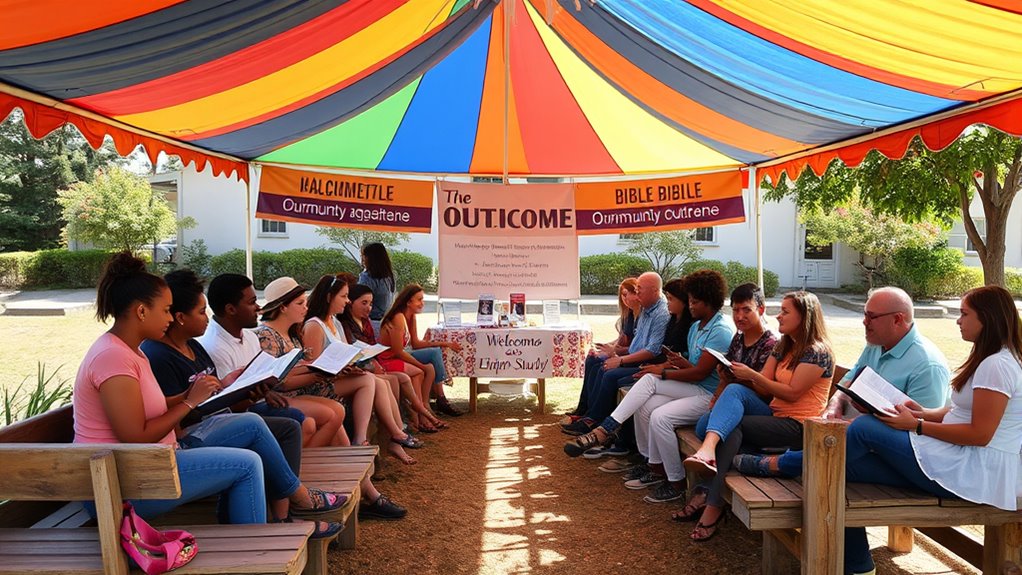
To successfully grow your community Bible study, you need to promote it intentionally and creatively. Focus on sharing the benefits of Scripture memorization to inspire interest and deepen engagement. Use social media, flyers, and community boards to reach a broader audience. Highlight the importance of volunteer recruitment to support outreach efforts and create a welcoming environment.
Remember to:
- Share personal stories and testimonies to connect with potential participants
- Offer easy ways for people to get involved, like hosting a kickoff event
- Use engaging visuals and clear calls to action
Effective promotion involves consistent messaging and emphasizing how your Bible study can positively impact lives. Keep your outreach authentic, approachable, and focused on community building.
Encouraging Growth and Developing Leaders
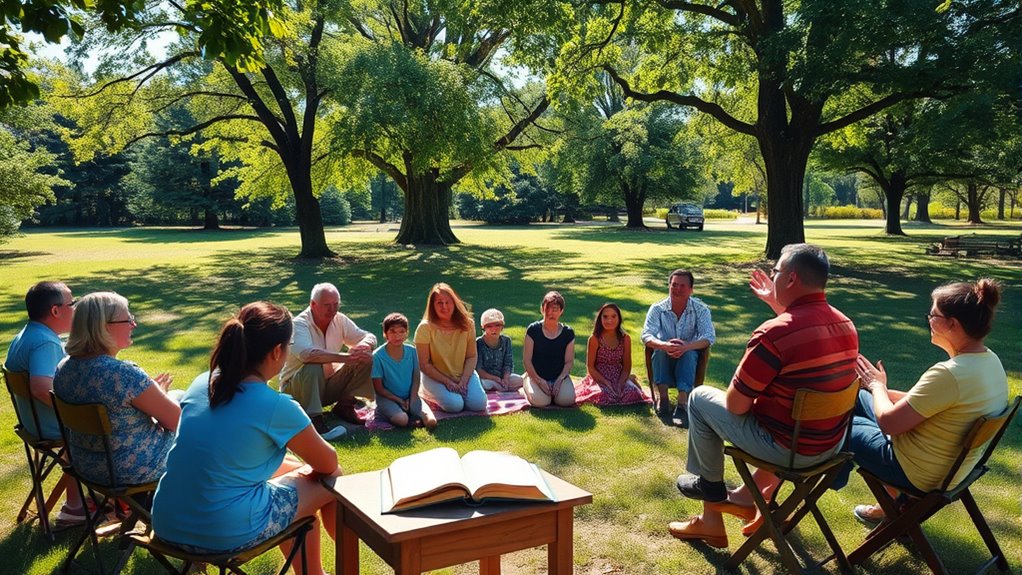
Encouraging growth and developing leaders are essential for sustaining and expanding your Bible study community. To foster faith building, create opportunities for members to share testimonies and deepen their understanding of Scripture. This not only strengthens individual faith but also inspires others. Leadership development is equally important; identify enthusiastic participants and equip them with responsibility, mentorship, and training. Offer them chances to lead discussions or organize events, helping them grow in confidence and spiritual maturity. As you nurture these leaders, they’ll motivate others and create a ripple effect of faith building within your community. Remember, a thriving Bible study isn’t just about attendance—it’s about cultivating a culture of spiritual growth and leadership that keeps your outreach vibrant and sustainable over time.
Frequently Asked Questions
How Do I Handle Conflicts Within the Bible Study Group?
When conflicts arise in your Bible study group, you should address them promptly using effective conflict resolution strategies. Focus on understanding group dynamics by listening actively and encouraging open, respectful communication. Stay neutral, avoid taking sides, and facilitate a solution that respects everyone’s perspectives. By fostering a safe environment, you help maintain unity and trust, ensuring your group remains a supportive space for spiritual growth and shared learning.
What Legal Considerations Should I Be Aware of When Starting Outreach?
When starting your outreach, you should prioritize legal compliance by understanding local laws and regulations for gatherings. Consider obtaining liability insurance to protect against potential accidents or claims. Make sure you have appropriate permissions or permits if required. Consulting with a legal professional can help guarantee you’re fully compliant. These steps help safeguard your group and ensure your outreach operates smoothly and responsibly within the legal framework.
How Can I Measure the Spiritual Growth of Participants?
You can measure participants’ spiritual growth through faith assessments and tracking spiritual milestones. Regularly ask reflective questions, observe changes in behavior, and encourage personal testimonies. Use surveys or journals to gauge understanding and commitment. Celebrate milestones like increased prayer, scripture knowledge, or service involvement. These indicators help you see progress, foster encouragement, and tailor future sessions to support ongoing faith development effectively.
What Resources Are Available for Training New Leaders?
You can access thorough leadership training programs designed specifically for community Bible study leaders. Many organizations offer resource materials like manuals, videos, and online courses to help you train new leaders effectively. These resources often include guidance on facilitation, spiritual mentoring, and organizational skills. By utilizing these tools, you guarantee your leaders are well-equipped, confident, and prepared to foster growth and engagement within your community.
How Do I Sustain Long-Term Interest and Commitment?
You keep long-term interest alive by blending motivational strategies with genuine community engagement. While challenges may test your resolve, celebrating small victories fuels passion, making your outreach meaningful. You foster commitment by creating a welcoming environment where participants feel valued and connected. Regularly sharing testimonies and progress keeps spirits high. Remember, sustained enthusiasm grows when you see real lives transformed, turning fleeting interest into lasting dedication.
Conclusion
As you launch your community Bible study, remember you’re planting a seed that can grow into a vibrant, faith-filled garden. With heart, purpose, and intentionality, you’ll create a space where lives are transformed and relationships flourish. Keep your eyes on the horizon, trusting that each connection you nurture is a step toward a brighter, more hopeful community—like a lighthouse guiding others safely home. Your efforts can truly light the way.

